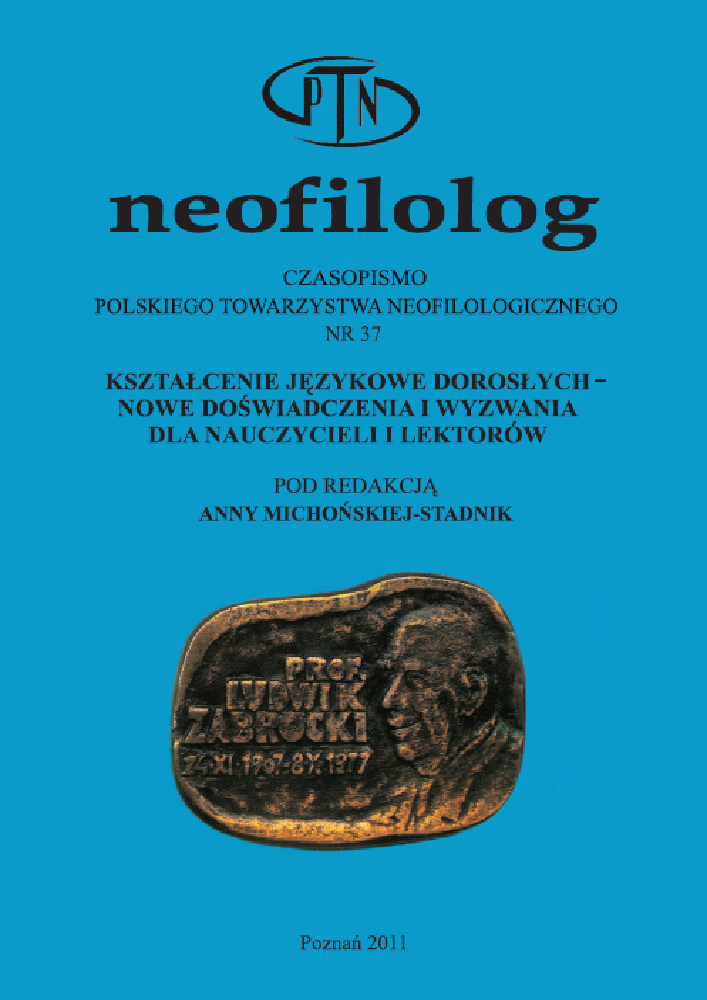Abstrakt
The article analyses the Swiss language policy, language planning and the partner – language model offered by the Swiss educational system. The Swiss language policy is most focused on extra-linguistic aims dealing with the changes in the social distribution of languages, and the promotion of multilingualism. Switzerland oscillates between two systems: the traditional language – partner model, and the choice of a language of wider communication (English). Much is indicative of the fact that now Swit-zerland is getting ready for multilingual future with English at hand.
Bibliografia
Bańbuła, S. 1998. O Szwajcarii… prawie wszystko. Warszawa: Wydawnictwo SGGW.
Baur, A. 1992. Szwajcarski fenomen. Warszawa: Wiedza Powszechna.
Blount, B. G., Sanches, M. (eds.). 1977. Sociocultural dimensions of language change. New York – San Francisco: Academic Press.
Bourdieu, P. 1986. „The forms of capital” (w:) J. G. Richardson (ed.). Handbook of theory and research for the sociology of education. New York: Greenwood Press: 241-258.
Cooper, R. L. 1989. Language planning and social change. Cambridge: Cambridge University Press.
Daoust, D. 1997. „Language planning and language reform” (w:) F. Coulmas (ed.). The handbook of sociolinguistics. Oxford: Blackwell: 436-452.
Dürmüller, U. 1986. „The status of English in multilingual Switzerland”, Bulletin CILA 44: 7-38.
Dürmüller, U. 1989. „Attitudes towards English as a possible lingua franca in Switzerland”, York Papers in Linguistics 14: 3-17.
Dürmüller, U. 1991. „Swiss multilingualism and intranational communication”, Sociolinguistica 5: 111-159.
Dürmüller, U. 1992. „The changing status of English in Switzerland” (w:) U. Ammon, M. Hellinger (eds.). Status change of languages. Berlin – New York: Mouton de Gruyter: 355-370.
Dürmüller, U. 1994. „Multilingual talk or English only? The Swiss experience”, Sociolinguistica 8: 44-64.
Dürmüller, U. 1997. Changing patterns of multilingualism. From quadrilingual to multilingual Switzerland. Zürich: Pro Helvetia.
Dürmüller, U. 2001. „The presence of English at Swiss universities” (w:) U. Ammon (ed.). The dominance of English as a language of science: effect on other languages
and language communities. Berlin – New York: Mouton de Gruyter: 389-403.
Ferguson, Ch. 1972 [1959]. „Diglossia”, Word 15: 325-340. Reprinted in: Pier Paolo Gigliolo, Language and social context. Selected readings. Harmondsworth: Penguin Books: 232-251.
Graddol, D. 2001. „The future of English as a European language”, The European English Messenger 10 (2): 47-55.
Grin, F. 1997. „Language policy developments in Switzerland: needs, opportunities and priorities for the next few years”, Swiss Political Science Review 3 (4): 108-113.
Grin, F. 1999. „Language policy in multilingual Switzerland: overview and recent developments”, ECMI Brief No. 2 (March). Flensburg: European Centre for Minority Issues.
Haugen, E. 1959. „Planning for a standard language in modern Norway”, Anthropological Linguistics 1 (3): 8-21.
Haugen, E. 1972. The ecology of language: essays. Selected and introduced by Anwar S. Dil. Stanford: Stanford University Press.
Jernudd, B., das Gupta, J. 1971. „Towards a theory of language planning” (w:) J. Rubin, B. Jernudd (eds.). Can language be planned? Honolulu: University of Hawaii Press: 195-215.
Kloss, H. 1966. „Types of multilingual communities, a discussion of ten varia-bles”, Sociological Inquiry 36 (2): 135-145.
Kolde, G. 1988. „Language contact and bilingualism in Switzerland” (w:) Ch. B. Paulston. International handbook of bilingualism and bilingual education. New York: Greenwood Press: 517-537.
Linder, W. 1996. Demokracja szwajcarska: rozwiązywanie konfliktów w społeczeństwie wielokulturowym. Rzeszów: Wyższa Szkoła Pedagogiczna.
Lotherington, H. 2004. „Bilingual education” (w:) A. Davies, C. Elder (eds.). The handbook of applied linguistics. Oxford: Blackwell: 695-718.
Murray, H., Dingwall, S. 1999. „The future of English in Switzerland: a majori-ty/minority problem?”, Bulletin suisse de linguistique appliquée 69 (2): 189-206.
Pap, L. 1990. „The language situation in Switzerland: an updated survey”, Lingua 80: 109-148.
Paulston, Ch. B. 1988. International handbook of bilingualism and bilingual education. New York: Greenwood Press.
Phillipson, R., Skutnabb-Kangas, T. 1996. „English only worldwide or language ecology?”, TESOL Quarterly 30 (3): 429-452.
Porębski, Cz. 1994. Na przykład Szwajcarzy…: eseje i rozmowy. Kraków: Znak.
Prcic, T. 2003. „Is English still a foreign language?”, The European English Messen-ger 12 (2): 35-37.
Ratajczak, M. 2004. Jak porozumiewają się Szwajcarzy? Media w wielokulturowej Szwaj-carii. Wrocław: Wydawnictwo Uniwersytetu Wrocławskiego.
Romaine, S. 1994. Language in society: an introduction to sociolinguistics. (2nd ed.). Oxford: Oxford University Press.
Schmid, C. L. 2001. The politics of language: conflict, identity and cultural pluralism in comparative perspective. Oxford: Oxford University Press.
Skutnabb-Kangas, T. 2003. „Linguistic diversity and biodiversity. The threat from killer languages” (w:) Ch. Mair (ed.). The politics of English as a world language: new horizons in postcolonial cultural studies. Amsterdam – New York: Rodopi: 31-52.
Steinberg, J. 1996. Why Switzerland? Cambridge: Cambridge University Press.
Szulc, A. 1999. Odmiany narodowe języka niemieckiego: geneza – rozwój – perspektywy. Rozprawy wydziału filologicznego, tom LXX. Kraków: PAU.
Watts, R. 1991. „Linguistic minorities and language conflict in Europe: learning from the Swiss experience” (w:) F. Coulmas (ed.). A language policy for the Eu-ropean Community: prospects and quandaries. Berlin: Walter de Gruyter: 75-101.
Watts, R. 1997. „Language policies and education in Switzerland” (w:) R. Watts, J. Smolicz (eds.). Cultural democracy and ethnic pluralism: multicultural and multi-lingual policies in education. Frankfurt: Peter Lang: 271-302.
Watts, R. 2001. „Discourse theory and language planning: a critical reading of language planning reports in Switzerland” (w:) N. Coupland, Ch. Candlin, S. Sarangi (eds.). Sociolinguistics and social theory. London: Addison Wesley Longman: 297-320.
Widmer, A., Laubscher, C., Fluegel, Ch. 1987. Herausforderung Schweiz. Materialien zur Förderung des Unterrichts in den Landessprachen. Bern: Schweizerische Konferenz der kantonalen Erziehungsdirektoren.
Licencja
Prawa autorskie (c) 1970 Agnieszka Stępkowska

Utwór dostępny jest na licencji Creative Commons Uznanie autorstwa – Bez utworów zależnych 4.0 Międzynarodowe.
Przedstawiany utwór (artykuł) upubliczniany jest na podstawie umowy z autorem i na licencji Creative Commons Attribution-NoDerivatives 4.0 International (CC BY-ND 4.0).
Użytkownicy mają obowiązek podania wraz z rozpowszechnionym utworem, informacji o autorstwie, tytule, źródle (odnośniki do oryginalnego utworu, DOI) oraz samej licencji;
- bez tworzenia utworów zależnych,
- utwór musi być zachowany w oryginalnej postaci.
Uniwersytet im. Adama Mickiewicza w Poznaniu zachowuje prawo do czasopisma jako całości (układ, forma graficzna, tytuł, projekt okładki, logo itp.).
